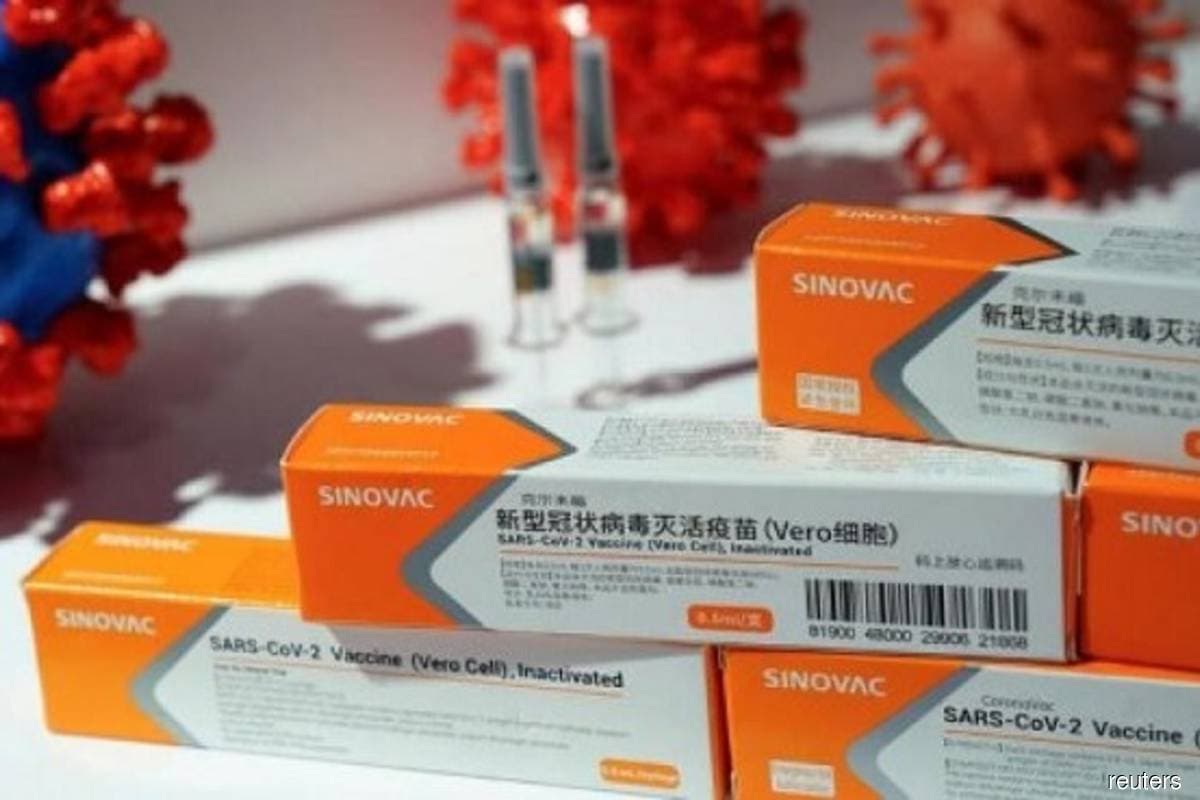
KUALA LUMPUR (Feb 10): The Ministry of Health’s Institute for Clinical Research (ICR) has called Pharmaniaga Bhd’s claim that two doses of Sinovac’s Covid-19 vaccine with one Pfizer-BioNTech booster is less effective against the Omicron variant of the coronavirus a misrepresentation of “prevailing facts and evidence”.
In a statement on Thursday (Feb 10), the ICR said it continues to recommend Pfizer or AstraZeneca as the preferred booster for Sinovac vaccine recipients.
“With reference to the media statement dated Feb 9, 2022 by Pharmaniaga regarding the lower effectiveness of heterologous boosting for Sinovac primary vaccination recipients against Omicron, the Ministry of Health Malaysia wishes to state that the prevailing facts and evidence are misrepresented.
“Globally, there is emerging and consistent evidence that heterologous booster vaccination results in more robust immune responses and is more effective than homologous boosting for recipients of primary series of inactivated vaccines (Sinovac),” it said.
Follow our Covid-19 vaccination tracker to see where we are in the race to herd immunity.
Among Sinovac recipients, the MoH said, a heterologous booster (Sinovac primary vaccination, followed by a Pfizer booster) offered greater protection against infection than a homologous booster dose (three doses of Sinovac).
“The WHO [World Health Organisation] advises that where countries are considering heterologous schedules, depending on product availability, mRNA or viral vector vaccines can be considered as third dose in those who received inactivated vaccines for initial doses.
“In line with emerging evidence and the ongoing Omicron wave, the Ministry of Health Malaysia continues to recommend Pfizer or AstraZeneca as the preferred booster for Sinovac vaccine recipients,” said the ICR.
Pharmaniaga, which is the licensed distributor of Sinovac vaccine in Malaysia, said previously that two doses of Sinovac Covid-19 vaccine with a Pfizer-BioNTech booster dose are less effective and produce a lower immune response against the Omicron variant compared with other strains.
The pharmaceutical group, in a statement on Wednesday cited a study conducted by Yale University, the Dominican Republic’s MoH and other institutions.
“Meanwhile, a separate recent research published by Sinovac Biotech Ltd shows that three doses of Sinovac Covid-19 vaccine produced higher neutralising antibodies in 95% of recipients compared with 3.4% by the second dose against variant of concern (VOC), including Omicron,” said Pharmaniaga.
Based on these findings, Pharmaniaga said, getting a Sinovac Covid-19 booster is highly recommended for those who have completed their primary vaccination, which offers better protection by creating an antibody response and providing good protection, especially against severe disease.
According to the ICR, a study done in Hong Kong found that a heterologous Pfizer booster following two doses of Sinovac improved neutralising antibody levels against Omicron variant at three to five weeks post-booster dose; however, three doses of Sinovac failed to elicit neutralising antibody responses to Omicron in most recipients.
The ICR also cited another study conducted in Brazil, which found that heterologous boosting (with AstraZeneca, Janssen, and Pfizer) resulted in more robust immune responses than homologous boosting (with Sinovac booster), and thus potentially stronger protection.
“The study found that heterologous booster doses of AstraZeneca, Janssen and Pfizer vaccines substantially increased the neutralising capacity of serum samples against both Delta and Omicron variants (at least 90% seropositive after booster), compared to strikingly lower responses observed after a homologous Sinovac booster with only 35% becoming seropositive against Omicron,” said the MoH.
“A preprint from a study conducted in Chile, based on real-world data (a national cohort data of 11.2 million people), observed an adjusted vaccine effectiveness against symptomatic Covid-19 of 78.8% for three doses of Sinovac, 96.5% for Pfizer booster (following two doses of Sinovac) and 93.2% for AstraZeneca booster (following two doses of Sinovac).
“The observed effectiveness against hospitalisation, ICU admission and Covid-19 related deaths were also higher for heterologous boosters (Pfizer, AstraZeneca) than homologous boosters (Sinovac),” it added.